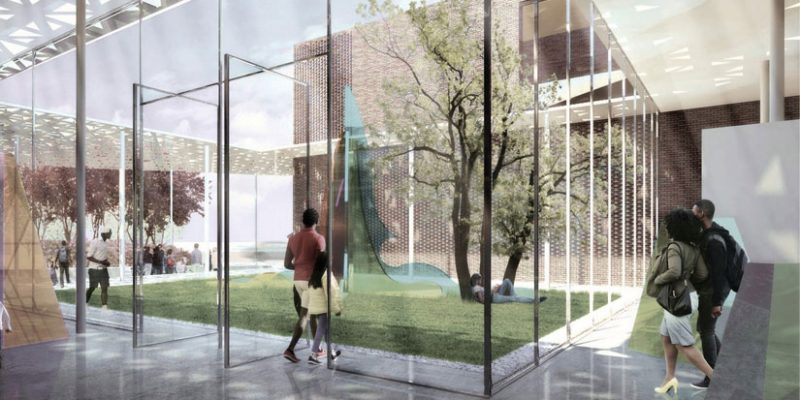As part of the School of Architecture & Urban Planning’s ongoing commitment to research and engagement, new M.Arch graduate students can apply for paid graduate research positions that nearly covers the cost of tuition (in-state).
Objective: Alongside expert faculty, paid graduate students will develop proficiency in researching and communicating advanced topics in architecture. Research will have broader implications for the field of architecture while reinforcing SARUP’s reputation as a leading research institution.
Requirement: Mellowes Graduate Researchers and additional graduate research positions detailed below are open to newly accepted incoming fall of 2024 Master of Architecture graduate students only.
Extended deadline: Jan 23, 2024
2024-2025 Mellowes Graduate Research Projects
The generous support of James and Maureen Mellowes has provided master’s research funding. Mellowes Graduate Researchers will receive a stipend totaling $11,000, dispersed over the semesters worked, which can be applied toward tuition. Summer work will be paid hourly.
For example, if work is completed during fall and spring, the student will receive two disbursements of $5500. If work is completed in spring and summer, $5500 is dispersed in spring and $5500 is paid out hourly over the summer.
Sam Schuermann
“Model Homes” aims to explicitly relate gender, labor, Taylorism, and architectural form through the study of a unique typology—practice homes—built on US college campuses during the early 20th century by Home Economics departments, where students lived and learned home management curriculum in community.
Roles and responsibilities of researcher:
- seeking out archival texts
- close readings of archival texts
- architectural drawing (plan, section, elevation, interior elevations, and RCPs) of specific model homes from American college campuses
- physical analytical model building of these model homes
Sergio Lopez-Pineiro
“Let’s talk! Reimagining assembly spaces for face-to-face democracies” documents the ordinary spaces where Americans of opposing political views hold transformative face-to-face conversations and redesigns them as new democratic assembly spaces to generate and symbolize trust between strangers.
- To search through library archives (physical, such as the Roberto Hernández Center records here at UWM, or online, such as the Joseph A. Labadie Collection at the University of Michigan) for photographs capturing conversations of this kind
- To draw the locations where these conversations occurred and the newly imagined alternative spaces
- To render the proposed spaces for public encounters
Brian Schermer
This research aims to enhance the sense of belonging for underrepresented college students by providing an online mapping tool for them to identify and suggest improvements to physical places on campus that can facilitate their social, intellectual, restorative, and symbolic engagement.
Roles and responsibilities of researcher:
- Assist in data analysis and interpretation (qualitative, quantitative, and GIS)
- Presentation graphics
- Website development
- Summit planning
Palmyra Geraki
This project renders visible the complexities and contingencies of the design process, expanding our understanding of what constitutes the built environment by exposing not only its underlying organizations but also the power structures that underlie the processes by which it comes to be (zoning, building codes, bureaucracies, relationships, hierarchies, structures of group work and collaboration, technological innovation etc).
Roles and responsibilities of researcher:
- researching how analysis is currently taught in architectural schools and practiced in the profession
- identifying case studies, providing outreach, coordination, and documentation support throughout the process of interviewing stakeholders, and analyzing the results
- producing layered drawings and complex physical models for the exhibition. The RA should demonstrate strong interest in the complexities of the design process (both internal and external to the discipline and the profession) possess an analytical mind and excellent writing skills, and show extreme attention to detail and craft in the production of architectural models
More Graduate research opportunities
These additional graduate research positions offer a stipend totaling $11,000, dispersed over the semesters worked, which can be applied toward tuition. Summer work will be paid hourly.
For example, if work is completed during fall and spring, the student will receive two disbursements of $5500. If work is completed in spring and summer, $5500 is dispersed in spring and $5500 is paid out hourly over the summer.
William Krueger
Compile and disseminate data using the latest LiDAR (Light Detection and Ranging) and photogrammetry documentation and software to explore applications within the realm of Architecture, Preservation, Conservation and Restoration and to inform academic and professional communities about adaptive re-use topics. Requirements: flexibility in scheduling and occasional travel.
Alex Timmer
The Design + Construction Institute student researcher will assist Director Alex Timmer on material investigations. This research will focus on pervious concrete and waste wood/cement composites.
2022 + 2023 Mellowes Research Projects
Elisabet Jatmiko will be working with Assistant Professor Lindsey Krug to develop a body of design research linking legal and architectural definitions of privacy in order to spatialize contemporary questions of bodily autonomy and agency—both nationally and within the state of Wisconsin. They are organizing a joint symposium and exhibition for 2024 that convenes designers, scholars, and practitioners from a wide range of disciplines to explore how the cultural emergence of privacy in the mid-20th century was and continues to be made material in our 21st-century world.
Research thermally active concrete structures through form and performance, with Assistant Professor Alex Timmer
Waste-related research and design work for a second book with Associate Professor Nikole Bouchard, titled Atlas of AFTERLIVES. This follows her first book WASTE MATTERS: Adaptive Reuse for Productive Landscapes (Routledge, 2021).
Bennett Westling will be helping Associate Professor Nikole Bouchard on her 2nd book titled Atlas of AFTERLIVES. This follows her first book WASTE MATTERS: Adaptive Reuse for Productive Landscapes (Routledge, 2021).
Duncan McGlachlin will be working on researching thermally active concrete structures through form and performance with Assistant Professor Alex Timmer.
Fouzia Emon will be researching and mapping waterfront cities of the Great Lakes Basin to address water-related climate resilience with Professor Jim Wasley.


